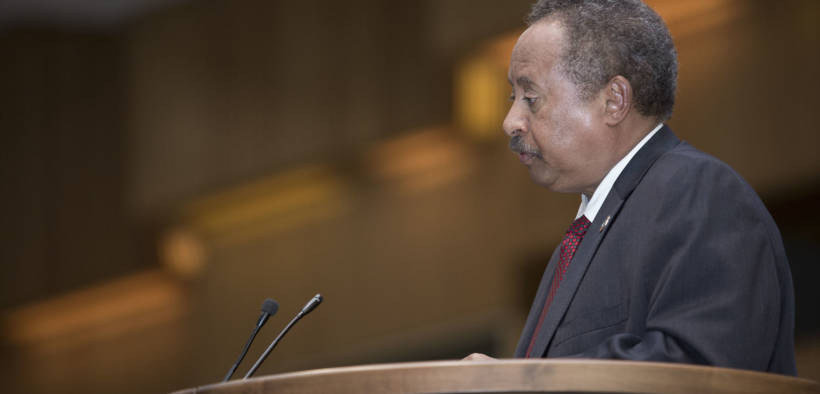Sudanese PM Warns Sudan Ripe for ISIS Takeover, Unless US Lifts Sanctions

“The US sanctions will shape the trajectory of this transitional government. If it goes wrong it will take years to reverse the damage.”
In an exclusive interview with The Independent on Sunday, Sudanese Prime Minister Abdalla Hamdok warn continued U.S.-imposed sanctions on Sudan were crippling the nation’s economy and would lead to a failed state, spawning a swath of terrorism across the region.
The Prime Minister’s remarks came shortly before he met with U.S. President Donald Trump in Washington in a first visit to the American capital since he took office in September of this year.
Fear of ISIS-like Terrorism
“Sudan is neighbored by seven countries that are plunged in troubles, and unless Sudan is de-listed, terrorism by the Islamic caliphate in Syria and Iraq, known as ISIS, will be seven caliphates,” Hamdouk told The Independent on Sunday.
In October 2017 the United States lifted decades of economic sanctions it had imposed on Sudan since 1993, for what Washington believed to be the recently deposed regime of President Omar al-Bashir’s role in harboring Osama Bin Laden and terrorists in the 1990s.
Though the trade sanctions were lifted for Sudan’s progress in fighting terrorism, the U.S. kept Sudan on its list of states that sponsor terrorism and kept restrictions on Sudan’s war-torn Darfur region.
Hamdok has warned that both such moves are crippling Sudan’s fragile economy, with many foreign countries still reluctant to invest in the African country that is said to be resource-rich with fertile farmlands, minerals and gold. The terrorism designation prevents Sudan’s businesses and, in particular, financial institutions from conducting U.S. dollar-based transactions and working with other international institutions.
Prime Minister Hamdok has urged Washington to de-list Sudan from the state harbinger of terrorism list, telling the Independent that his government which was formed three months ago within a power-sharing agreement has shown a readiness to counter terrorism.
“We are opening our hands to international players for work against terrorism. If our country will not be de-listed, then terrorism will be small fry compared with what ISIS has so far brought to the entire region,” Hamdok said.
In December 2018 Sudan saw mass protests against high food prices and unemployment. The protests led to the overthrow of former Sudanese President Omar al-Bashir and the formation in September 2019 of a power-sharing cabinet comprised of six military officials and five civil members. The transitional government has been assigned with running the country for a transitional period of three years after which elections are to be held.
A Fragile Economy
Sudan’s economy has remained fragile over the past several years with Sudan’s Darfur region devastated by internal wars. Hamdok claimed that the U.S.-imposed sanctions are weakening his government and making it difficult for it to address Sudan’s dire economic conditions which sparked Sudan’s revolution.
According to The Independent’s report, Sudan’s inflation is at 60 percent and the black market exchange rate for the dollar reached 82 Sudanese pounds, double the official rate. Sudan is also struggling with a debt that has amassed to $60 billion and is in need of another $8 billion in foreign aid over the next two years to avert an economic collapse.
“No serious investor will take the gamble and invest in a country that is isolated from the international payment system. It has eroded investor confidence. So many good businesses have been shattered and industries reduced to scraps throughout the years,” Hamid E Ali, a Sudanese economy professor at the American University in Cairo, told The Independent.
“The US sanctions will shape the trajectory of this transitional government. If it goes wrong it will take years to reverse the damage,” he added.
Last month, Sudanese Defense Minister Mohamed Jamal Eldin Omar met in the Sudanese capital of Khartoum with the U.S. envoy to Sudan and South Sudan, Donald Booth. Omar told his guest that his country is interested in normalizing relations with the U.S., hoping that Washington will de-list Sudan as a country that sponsors terrorism.
The U.S. has, however, grown frustrated with South Sudan’s failure to form a national unity government. Bryan Hunt, director of the office of Sudan and South Sudan with the U.S. State Department, told reporters in early October at the U.S. Institute of Peace that his administration does not want to continue to hear arguments for why more time must be given.
Hunt also suggested that the U.S. would reconsider its relationship with South Sudan and hinted at possibly considering imposing sanctions, though he maintained the U.S. would not impose economic sanctions.
Sudanese Revolution
Since last December Sudan has lived through mass demonstrations in protest of the soaring prices of goods and commodities as well as inflation. The protests recently pushed the Sudanese army to overthrow the authoritarian President Omar al-Bashir who remained in power for more than three decades.
However, the country has been in a state of chaos after the ousting of al-Bashir with no clear successor to lead the country. Sudan’s military assumed power, but June 3 the military opened fire and murdered more than 100 protesters outside the military’s headquarters, intensifying worry that Sudan would become a military dictatorship. While a power-sharing transitional government was agreed to consisting of military and civilian officials, the original November 12 deadline for forming the full national unity government was recently pushed back another 100 days.













